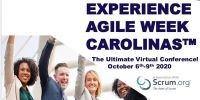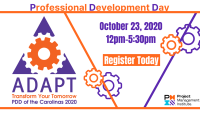Special Event
How to Create Time to Study for Professional Certifications Despite a Busy Schedule

Registration often fills up well in advance, so register early if interested.
As professionals, career development is top of mind, Oftentimes, career goals are set at the beginning of each year or during the year. Having professional certifications are sometimes part of our career goals because certifications show credibility and prove our knowledge in the industry.
However, with busy schedules and so many things vying for our time, it could be difficult to find time to prepare, study and pass the certification exams. Thus not able to achieve the career goal set. This is a huge challenge especially for Project Professionals.
Agile Week Carolinas

LEARN FROM TOP AGILE LEADERS. SEE THE OPPORTUNITIES AVAILABLE TO YOU.
Agile Week Carolinas™ is a week long online series of events where attendees can learn, engage and connect with knowledgeable presenters & partners!
Agile Week Carolinas™ provides a dedicated platform for Companies, Teams and Individuals to discover what’s NEW, CHANGING, or TRENDING in Agile as a global community!
PDD of the Carolinas

- Cost: $79 per person ($69 per active duty or military veteran).
- PDUs: Up to 11 for prospective or current PMPs (PDUs vary for other certifications i.e. PgMP, PfMP)
AI and ML: How to future-proof your PM career

About the Presenter
Michael Roberts is an IT industry professional with more than 20 years of experience in project management and taking digital products to market. His industry certifications include those from Cisco, CompTIA, Microsoft, ICAgile, and the Scaled Agile Framework. With his experience as a technology executive, he has guided many companies through successful IT and software projects and become a skilled strategist who transforms strategic plans into workable solutions and benchmarks performance against key operational targets/goals.
Presentation Summary
We all know Artificial Intelligence (AI) and Machine Learning (ML) are two huge factors in the change in technology and business. But what is their impact on you? What will your job look like five years from now? Will it even exist in five, 10, or 20 years? And what will happen to the organization and industry in which you work?
All these questions, and more, can be answered in this 45 to 60-minute talk around AI and ML. We will discuss the definitions of these two terms, how they impact business and workers, and what things project managers can do today to prepare for the future.
Learning Objective of Presentation:
• What is Artificial Intelligence (AI)?
• What is Machine Learning and how does it apply to AI?
• A review of some real-world AI/ML projects being used today.
• Roles and skills that PMs can look to in the future
Presentation by Lawrence Reid, PMP, CBAP, CSM (Bedford, Texas)

Managing Customer Relationship Management (CRM) Selection & Implementation Projects
Summary Description of Presentation:
CRM solutions are complex and impact many departments throughout the organization and beyond. The tools and techniques used to manage these complex implementations and integrations are also continuing to evolve. Traditional waterfall and agile methodologies both have their place in the CRM lifecycle.
The era of CRM began as a progression from just sales automation to encompass a more holistic view of the customer. In the early years, CRM was considered a novelty or luxury. Today, CRM systems are as crucial to running a business as the company’s accounting system. In fact, they are tightly integrated to manage the products or services for sales, pricing, inventory, and customer credit. Customer support is no longer an afterthought either. Now, it is also built directly into the CRM as a part of the customer life cycle.
In the future, the influence of social media will shape how companies use CRM systems. A.I. as augmented information or artificial intelligence will continue to evolve and impact CRM implementations and the way we manage them.
Learning Objectives:
• Understand what a CRM is and why is it critical to organizational success
• Learn how to identify CRM stakeholders
• Understand the roles of the major stakeholders
• Learn how to manage collaboration across stakeholder groups
• Understand which metrics to use to measure success
• Learn how to apply mastery of these skills to other types of projects

